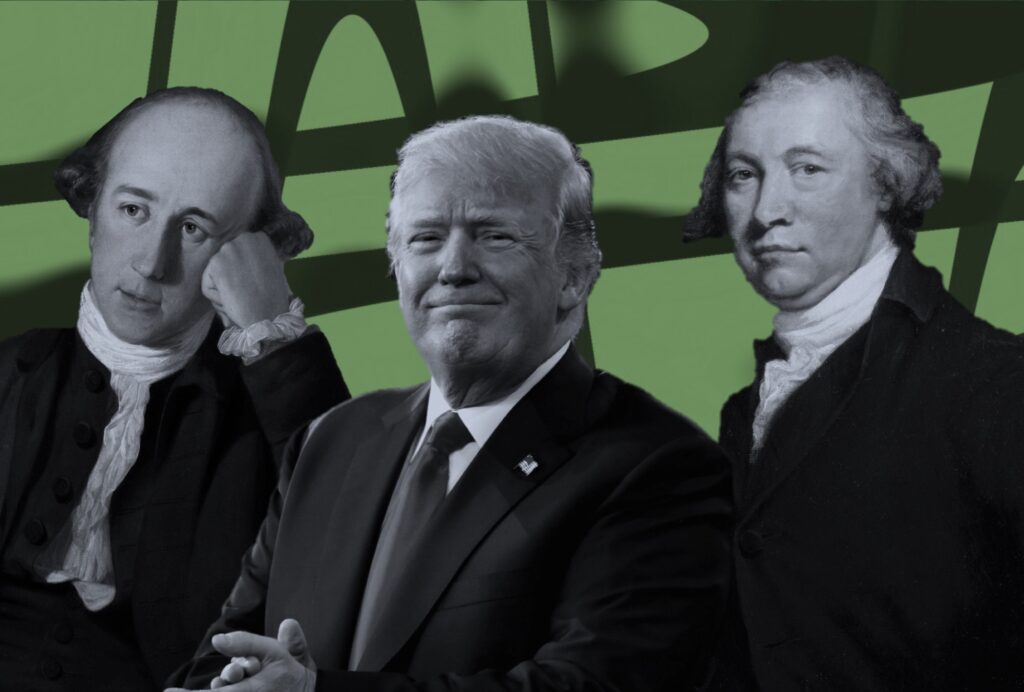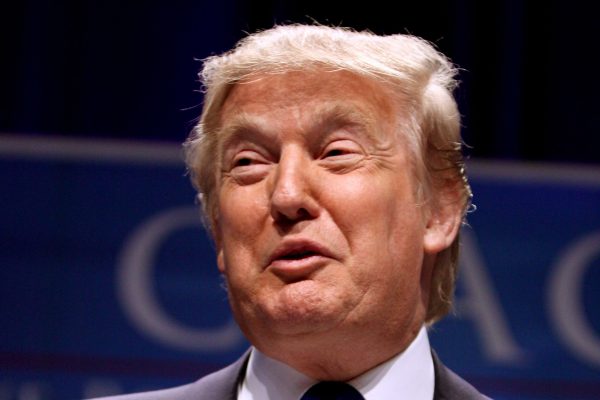One of the notable features of the impeachment process just concluded in Washington was the polemical appeal to history. Progressive law professors dispensed an emphatically originalist approach to the interpretation of the Constitution, while lawyers for the president showed a sudden and suspicious interest, as Alan Dershowitz said, in “dusty old books.” Among other things, the arguments of the two sides featured warring references to the intent of the founding fathers, obscure cases such as the 1725 impeachment of the first Earl of Macclesfield in the British House of Lords, and William Blackstone’s Commentaries on the Laws of England (1765). History was once again being used as a cover for the exercise of contemporary political will.
Arguments on both sides of the Trump impeachment shared an underlying complacency about the nature of U.S. imperial power.
Tellingly, these Trump-centric arguments—on both sides—shared an underlying complacency about the nature of U.S. power on the global stage. Imperial power was also the issue at the core of one of the historical precedents that figured in our own recent turmoil: the impeachment of the English statesman Warren Hastings for acts he committed as governor-general of India during the 1770s and ’80s.
When history is allowed to enter U.S. political debate, it often does so through an exceedingly narrow gate, defined by the needs of adversarial constitutional law. In fact, the sanitized version of the Hastings affair admitted to our recent impeachment proceedings stripped that event of all of the substantive content that made it one of the eighteenth century’s most powerful critiques of imperial hubris. Recovering that context can help us to understand that Trump’s impeachment also passes through some unspoken and widely shared assumptions about the capacity of the United States to grant other nations something less than the “equal station” evoked in our Declaration of Independence.
Hastings’s impeachment was one of the great constitutional dramas of the late eighteenth century, not only because of the nature of his offenses in India, but also because of the identity of his prosecutor-in-chief: Edmund Burke. By the start of the Hastings trial in 1788, Burke had been a Whig member of Parliament for more than two decades—starting in 1766, in the midst of the Stamp Act controversy that conventionally marks the beginning of the American Revolution. In his speeches “On American Taxation” (1774) and “On Conciliation with America” (1775), Burke emerged as a leading critic of British coercion of the colonists and an advocate for a negotiated resolution to the imperial crisis. He is perhaps best known as the author of the brilliant Reflections on the Revolution in France (1790) that predated but seemed nonetheless to anticipate the excesses of the movement to overthrow the ancien régime.
The Hastings affair fell in between these landmark moments of the Atlantic revolutionary era. Indeed, the path to the Hastings impeachment passed through some of the same events that made the American and French revolutions possible—most notably the Seven Years’ War (1756–1763), which ended with Britain displacing France as the leading European power in the Indian subcontinent. Two years after the war ended, the British East India Company wrangled the right to collect the diwan (land tax) for the territories of Bengal and Bihar from the Mughal emperor. This new power transformed it from a monopoly trading company into a territorial sovereign (or a “company-state,” in the historian Philip Stern’s suggestive phrase).
The sanitized version of the Hastings affair in recent impeachment arguments stripped that event of all that made it one of the eighteenth century’s most powerful critiques of imperial hubris.
In an effort to assert greater oversight of the company’s all-powerful officials and private army in India, Parliament in 1773 created the position of governor-general, a post that Hastings would inaugurate and hold for more than a decade. For Burke and other critics of Hastings, this dual system of public and private government did little to restrain the worst impulses of Britain’s imperial presence in the subcontinent. The twenty-two articles by which Burke charged Hastings in the House of Commons in 1786–1787 included everything from financial malfeasance and bribery to stealing the land of orphans and promoting the rapacious treatment of rural communities across vast swaths of the Mughal Empire. In contrast to the approach of contemporary House Democrats, Burke and his fellow Commons managers decided to throw the kitchen sink at Hastings: a litany of imperial wrongs unified by Burke’s conviction that the British East India Company had degenerated from a legitimate commercial project into a corrupt instrument of territorial conquest. (This argument is made in detail in Richard Bourke’s 2015 study, Empire and Revolution: The Political Life of Edmund Burke.)
This expansive approach to impeachment gave Burke the opportunity to conduct an extended lesson in imperial civics (even if it came at the risk of dissipating the case against Hastings). The very first charge, for example, alleged that Hastings and the East India Company were complicit in making war on the Rohillas, a group of Pathan military chiefs who in the 1720s settled in a majority-Hindu region of northern India ensconced between rival Indian powers. Allied to one of these powers, the Nawab of Awadh, the Company decided to throw its military support behind the Nawab’s ruthless campaign to rid the region of the Rohilla Afghans—an early and notorious episode of ethnic cleansing. This charge did not make it past the House of Commons, but it informed Burke’s great speech of February 1788 opening the trial in the House of Lords. The Company’s reign in India, he said, had yielded
violent sales, fraudulent purchases, confiscations, inhuman and unutterable tortures, imprisonment, irons, whips, fines, general despair, general insurrection, the massacre of the officers of revenue by the people, the massacre of the people by the soldiery, and the total waste and destruction of the finest provinces in India.
Burke concluded his speech with a thundering refrain impeaching Hastings “in the name of the Commons of Britain . . . the people of India . . . those eternal laws of justice, which he has violated . . . [and] in the name of human nature itself, which he has cruelly outraged, injured, and oppressed.”
This aspect of the Hastings impeachment—its powerful indictment of an empire thoroughly corrupted by the pursuit of profit at any cost—was glaringly absent in the trial of President Trump. Instead, the Hastings affair was made into a touchstone for originalist constitutional interpretation. The president’s trial memorandum cited the Hastings impeachment in support of the proposition that a president cannot be impeached until he has first been heard by the House of Representatives. (As I have told my students, this frivolous rendering of the significance of the Hastings case earns an emphatic F on both historical and legal grounds.) A more contentious dispute asked how the Hastings affairs shaped the framers’ understanding of the meaning of “high crimes and misdemeanors.” Dershowitz argued that the framers meant this term to encompass only conduct that can be charged under existing criminal law. Because (according to Dershowitz) abuse of power and obstruction of Congress are not criminal offenses, it follows that the president cannot have been guilty of impeachable conduct.
In contrast to the approach of contemporary House Democrats, Burke and his fellow Commons managers decided to throw the kitchen sink at Hastings, charging him with a litany of imperial wrongs.
The vast majority of scholars who have studied this matter disagree with this interpretation of the framers’ intent, citing an exchange between George Mason and James Madison that occurred near the very end of the 1787 Constitutional Convention. (The framers convened in Philadelphia only days after Hastings was arrested and made to appear before Parliament for the first time, and the Hastings trial was widely reported in the American press.) On September 8, according to Madison’s notes, Mason objected to a proposed version of the impeachment clause that would have applied only to “treason and bribery.” Mason, like Madison a delegate from Virginia, pointed out that “treason as defined in the Constitution will not reach many great and dangerous offences. Hastings is not guilty of treason.” Mason therefore proposed to remedy the narrowness of the proposed clause by adding the offense of “maladministration.” After Madison replied that such an amendment would make the president removable at the pleasure of the Senate, Mason promptly withdrew his amendment and substituted the phrase “other high crimes and misdemeanors”—a modification that was approved by a vote of eight to three.
As Frank Bowman and other constitutional scholars have persuasively explained, this passage—which pivots almost entirely on the Hastings affair—suggests that the framers did not understand “high crimes and misdemeanors” to be limited to those offenses that were specified in the existing criminal law. In his opening speech before the House of Lords in February 1788, Burke argued that Hastings’ misdeeds “were crimes, not against forms, but against those eternal laws of justice, which are our rule and our birthright: his offenses are not in formal, technical language, but in reality, in substance and effect, High Crimes and High Misdemeanors.” Because the twenty-two articles of impeachment against Hastings did not recite technical criminal offenses but rather abuses of the natural rights of the Indian people, it follows that Trump need not have committed criminal official conduct in order to be guilty of “high crimes and misdemeanors.”
With Trump’s impeachment, the “mere” exercise of U.S. imperial power, per se, seemed to pass muster as an entirely innocent matter.
In contrast to these narrowly instrumental readings of the Hastings case, historians and political philosophers have turned to Burke and the late eighteenth century for a different set of lessons. For some, those lessons have to do with the importance of using persuasive moral rhetoric in framing political and legal debates. As Rob Goodman notes in the Atlantic, Burke’s purpose in concentrating his rhetorical firepower on a single figure (Hastings) was to “shape public perception of the system under which such a man had come to accumulate such power.” Indeed, the “system” was the only real target of Burke’s eloquence, for Hastings had retired from the governor-generalship in 1785; a conviction would not have resulted in his removal from office. (In 1795 Hastings was finally acquitted on all counts.)
Critique of “the system” is precisely what is missing from our own impeachment drama. That spectacle has centered, instead, on the narrow question of whether the sitting president can and should be removed from office. In the highly polarized and polemical back and forth between the prosecution and defense of the past few weeks, what was lacking was an understanding of the larger imperial apparatus in which our partisan national debates are contained.
Historical affairs such as the Hastings or Trump impeachments are not reducible to the motives and actions of single individuals; they inhabit contexts not captured by narrow legal disputes.
Indeed, the core of the case against the president was not that he was attempting to dictate how another country should conduct its affairs; it was, rather, that he was doing so in order to discredit a political opponent, thereby inviting foreign interference in a U.S. election (and, in the process, defying a congressional determination as to how U.S. foreign aid should be distributed). The “mere” exercise of U.S. imperial power, per se, seemed to pass muster as an entirely innocent matter. It was assumed on both sides of this ferocious political contest that it is the role of the United States to tell other countries how they ought to act in matters of their own domestic policy. Does the provision of foreign aid, military or otherwise, license one nation to exert pressure on other nations that “voluntarily” accept that aid? And is a country staring down the barrel of a Russian gun acting “voluntarily” in any meaningful sense?
The relationship between the United States and Ukraine today, of course, is very different from that between Britain and India in the eighteenth century. And there is no doubt that the Trump presidency poses many dangers. There are thus urgent political reasons for historians—as both citizens and scholars—to oppose his particularly authoritarian and racist brand of presidential leadership. One way of doing so is to widen the narrow gate through which history enters political and legal discourse. Historical affairs such as the Hastings or Trump impeachments are not reducible to the motives and actions of single individuals; they inhabit contexts not captured by narrow legal disputes. Finding ways to admit these contexts into our politics is a form of resistance in an increasingly presentist political culture. In this respect, the far-reaching critique of imperial power that the Age of Revolutions generated still has important lessons to teach us about lingering blind spots of our own, ostensibly post-imperial political culture.
This essay is adapted from the author’s recent contribution to the Age of Revolutions journal.







